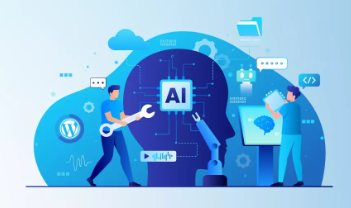Artificial Intelligence (AI) has made its way into nearly every aspect of modern technology, and WordPress development is no exception. As the world’s most popular content management system (CMS), WordPress has embraced AI tools to help developers, marketers, and website owners create smarter, faster, and more intuitive websites.
From enhancing content creation to improving SEO, user experience, and security, the integration of AI in WordPress development is transforming how websites are built and managed. In this article, we’ll explore 10 powerful use cases that show how artificial intelligence is revolutionizing the WordPress ecosystem.
1. AI-Powered Content Creation
One of the most widely recognized use cases of AI in WordPress is content generation. Tools like ChatGPT, Jasper, and Writesonic can generate high-quality blog posts, product descriptions, and headlines directly from the WordPress dashboard.
With the help of natural language processing (NLP), these AI tools can:
-Generate article drafts based on keywords or topics
-Create compelling meta descriptions
-Rewrite or summarize content
This boosts productivity for bloggers and marketers and helps keep content fresh and optimized without the need for manual writing.
2. AI in WordPress SEO Optimization
Search Engine Optimization (SEO) is critical for visibility, and AI tools are enhancing this process in WordPress. Plugins like Rank Math and All in One SEO now include AI features to optimize content automatically.
AI can:
-Suggest relevant keywords based on content
-Analyze on-page SEO factors
-Optimize headings, meta tags, and internal linking
-Predict how well content will rank
By using AI-powered SEO tools in WordPress, site owners can improve their rankings without hiring dedicated SEO experts.
3. Smart Chatbots for Customer Support
AI chatbots have become essential for WordPress websites that offer products, services, or customer interaction. Plugins like Tidio, WP-Chatbot, and LiveChat use AI to answer common customer queries 24/7.
Use cases include:
-Handling FAQs
-Providing real-time support
-Guiding users through sales funnels
-Collecting feedback
These AI chatbots in WordPress enhance the user experience and reduce support workload significantly.
4. AI Image Optimization
High-resolution images can slow down your site. AI tools such as ShortPixel AI, Optimole, and Smush Pro use intelligent algorithms to compress and optimize images without reducing quality.
AI can:
-Automatically detect and resize images for different screen sizes
-Choose the best format (e.g., WebP)
-Apply lazy loading intelligently
This use case of AI in WordPress development boosts performance and contributes to better SEO.
5. AI for Website Personalization
Web personalization enhances user engagement. AI tools can analyze user behavior and dynamically change website content based on interests, location, or previous actions.
For example:
-Show personalized product recommendations
-Tailor blog post suggestions
-Adjust language or design for different audiences
-Plugins like If-So and RightMessage enable AI-driven personalization in WordPress websites.
6. Spam Protection and Filtering
Spam is a huge issue for WordPress sites, especially in comment sections and contact forms. AI tools such as Akismet and CleanTalk use machine learning algorithms to distinguish between spam and legitimate messages.
These tools improve over time and provide more accurate filtering than traditional CAPTCHA methods. This use case showcases how AI improves WordPress security.
7. AI-Based Voice Search Integration
As voice search becomes more popular, integrating voice functionality into WordPress sites gives a competitive edge. AI-driven tools and APIs like Google Voice Search and Microsoft Azure Speech can be embedded into WordPress to allow voice-based navigation and search.
This is particularly useful for:
-E-commerce sites
-Accessibility enhancements
-Mobile-first websites
8. AI for Predictive Analytics and Insights
AI doesn’t just report what happened—it can predict what’s likely to happen next. AI analytics tools can forecast traffic patterns, identify high-converting pages, and suggest improvements for site design or content layout.
Jetpack AI and Google Analytics with AI integrations can:
-Highlight trends before they peak
-Detect anomalies in traffic or engagement
-Recommend CTAs or layout changes based on user flow
This enables smarter, data-driven WordPress development decisions.
9. AI-Assisted Code Generation and Debugging
For developers, AI in WordPress development goes far beyond content. Tools like GitHub Copilot and CodeWP can assist in generating code snippets, debugging errors, or suggesting functions based on the context of your theme or plugin.
Use cases include:
-Custom shortcode creation
-Plugin development support
-Error handling suggestions
This speeds up development cycles and reduces the learning curve for new developers.
10. AI for Accessibility Improvements
Accessibility is often overlooked in web design, but AI can help. WordPress plugins that use AI can automatically:
-Generate image alt text
-Adjust color contrast for readability
-Enable text-to-speech
-Flag accessibility issues in real time
These tools ensure compliance with WCAG guidelines and improve the user experience for all visitors.
Final Thoughts
The role of AI in WordPress development continues to expand, offering powerful solutions for content creation, SEO, performance, personalization, and security. Whether you’re a developer, designer, marketer, or site owner, integrating AI tools into your workflow can save time, improve quality, and elevate your user experience.
As more plugins and APIs embrace artificial intelligence, we can expect even smarter, more adaptive websites in the years to come. The future of WordPress is not just about design or content—it’s about intelligent automation and smarter digital experiences.

